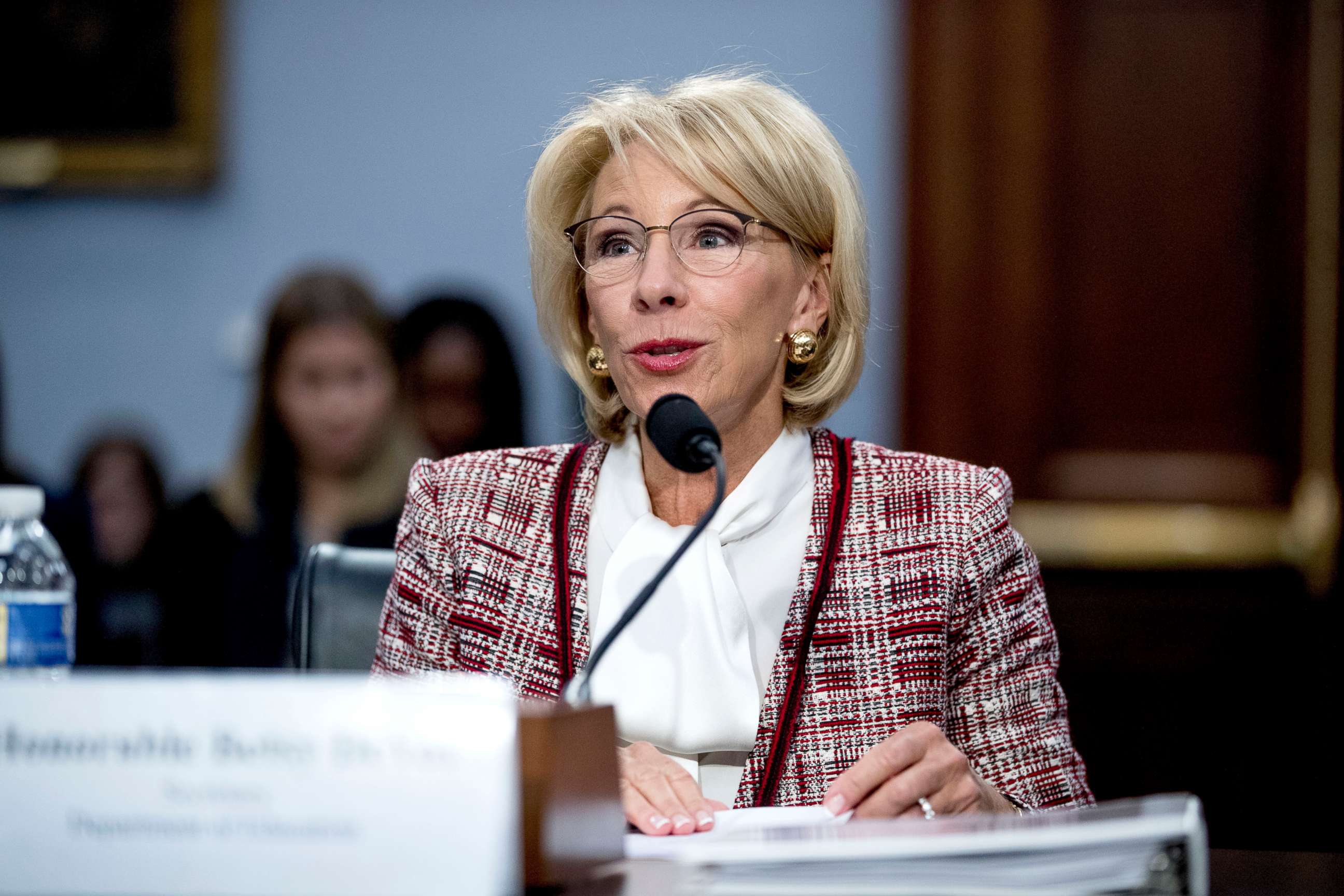Education Secretary Betsy DeVos responds to critics over proposed elimination of Special Olympics funding
Betsy DeVos' exchange on Capitol Hill about Special Olympics funding went viral.
Education Secretary Betsy DeVos was fighting back Wednesday after her exchange on Capitol Hill about the Trump administration's proposal to cut funding from the federal budget for Special Olympics went viral.
DeVos argued that her position was mischaracterized, and said, "It is unacceptable, shameful and counterproductive that the media and some members of Congress have spun up falsehoods and fully misrepresented the facts."
On Tuesday, DeVos appeared before the House Appropriations Education Subcommittee to answer questions about the Trump administration's proposed budget. The proposal asks Congress to approve a budget that would decrease the department's funding by $7.1 billion compared to what it was given last year.
Part of the suggested cuts include the proposed elimination of 29 programs -- which also includes eliminating $17.6 million earmarked for the Special Olympics. The suggestion to cut Special Olympics funding has been part of past budget proposals under the Trump administration, however, it is highly unlikely the administration's budget will be passed as it was initially proposed and is more a look at where the White House's priorities are for the year.
In a statement on Wednesday, the chairman of the Senate appropriations subcommittee that handles education said it would "not cut funding for the program."
"I'm a longtime supporter of Special Olympics and proud that Missouri is home to the largest Special Olympics training facility in the world," Sen. Roy Blunt, R-Mo., said. "I was just at the World Games and saw, as I have many times before, what a huge impact the organization has on athletes, their families, and their communities. Our Department of Education appropriations bill will not cut funding for the program."

Timothy Shriver, chairman of Special Olympics International, clarified in a lengthy statement Wednesday that the money from the government does not go to the Special Olympics competition, but is earmarked for special needs education in schools. Funding for the event comes from philanthropic contributions. But he emphasized the federal funding was "critical" to future of the country and called out the government's lack of dedication to the cause.
"Everywhere we look people are starving to be able to infuse our young people with the hope that comes from being inclusive with the confidence that comes with seeing justice realized, with that joy that comes from exercise -- exercising their skills in pursuit of a more welcoming future," Shriver wrote. "These are lessons being taught in schools by Special Olympics programs and they are critically the responsibility not just of the volunteer sector but our elected leaders."
Shriver also thanked "many members" of Congress, both Republican and Democrat, for their support.
On Tuesday, Rep. Mark Pocan, D-Wis., challenged DeVos on the proposal to eliminate funding for the Special Olympics, pointing out that it would affect 272,000 children.
DeVos defended the proposal saying that the department "had to make some difficult decisions with this budget."
She later added: "I think Special Olympics is an awesome organization, one that is well supported by the philanthropic sector as well."
The proposal gained traction on Tuesday among critics of the Trump administration, and had everyone from former Republican Ohio Gov. John Kasich to ESPN commentators weighing in.
In her statement on Wednesday, DeVos said the administration is "focused every day on raising expectations and improving outcomes for infants and toddlers, children and youth with disabilities, and are committed to confronting and addressing anything that stands in the way of their success."
She continued, "The Special Olympics is not a federal program. It’s a private organization. I love its work, and I have personally supported its mission. Because of its important work, it is able to raise more than $100 million every year. There are dozens of worthy nonprofits that support students and adults with disabilities that don’t get a dime of federal grant money. But given our current budget realities, the federal government cannot fund every worthy program, particularly ones that enjoy robust support from private donations."




